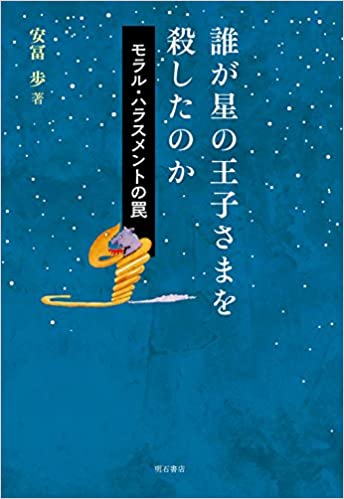BOOK

“Le petit Prince” and “Who killed Le petit Prince?”
"Le petit Prince"
Saint-Exupéry Publication year 1943
"Who killed Le petit Prince?~The Trap of Moral Harassment"
Ayumi Yasutomi Publication Year 2014
☆☆☆
The story of "Le petit Prince" is so famous that I don't think I need to explain it now, but there are many people who have never actually read it, so I will explain it a little.
I", a pilot who crash-lands in the desert, meets a little boy. The boy is a prince who left his small planet and traveled to many stars before arriving on the seventh planet, Earth. I continue to listen to the prince's story and eventually learn that he has walked thousands of miles to return to the point where he fell a year ago. On the same day, one year after the fall, the prince lets a snake bite him and collapses on the sand.
The cute illustrations were drawn by Saint-Exupéry himself, and the pictures are very famous, and have been familiar to me since I was a child, as they became mugs and pencil cases. However, when it came to the story, I had very little memory of it, or rather, I read it, but could not really understand it.
First of all, the prince was just a small child, which was very different from the imaginary setting. There are many strange characters in the story, but no princesses, no monsters, just one cheeky talking rose. And the prince, though small, had the job of plucking the buds from a dangerous baobab tree.
This was clearly not a story for children, but for adults.
What did the rose that came from somewhere one day and bloomed on the prince's planet indicate? Perhaps a woman, Consuelo, who was Saint-Exupéry's wife?
When the prince encountered the rose for the first time, he was amazed.
"How beautiful you are!"
The rose replied, "Isn't it? The prince replied cryptically, "Isn't it?" and ordered the prince to take care of his breakfast.
From there, the prince is dominated by the self-conscious and difficult rose, suffers, and decides to leave the planet.
What does this mean?
If you read it as a child, you just think, "I don't like those mean roses," but if you read it as an adult, it brings back memories that make your heart swoon, memories of bad times you have had somewhere else.
The interaction with the rose, the sense of discomfort the prince feels as he continues his journey, and the anger he sometimes shows through his interactions with the pilot "I"… These are just some of the annoying interactions of human adults that are hidden behind a soft story. This is the epitome of so-called mental abuse and moral harassment.
The book "Who Killed Le petit Prince?" was written with this point in mind.

The most important point of this book is that it points out the danger of misinterpretation of the most important message of "Le petit Prince," that the most important thing is invisible.
-The most important thing is that you can't see it.
When you say that, I think, "Oh, adults have dirty and cloudy minds, so they can't see what's really going on because they can't see the eyes of their hearts.
However, Mr. Yasutomi believes that there is a lot of truth in what we can see, and that the interpretation that "the most important thing is invisible" is very dangerous, especially in terms of the "abuse" implied by this story.
In other words, he points out that if the abused person interprets the essence of the abuser as "love for me," then the assumption that "what is invisible is true" will develop into something even more dangerous, and he will never be able to escape the abuse again.
You might think that is a bit of a leap.
However, the domestic violence victims around me, the moral harassers in my family, the lovers who only give me money and goods and have no integrity…
Why are the victims so willing to accept such a tragic situation? There is the thought, "He (she) really loves me. What is important is not visible to the eye…" That is why they accept this tragic situation.
It is unclear whether Saint-Exupéry, the author of "Le petit Prince," meant it to be abusive or not. However, if you read "Letter to General X," one of the important documents in the study of Saint-Exupéry, you will find that he complains about the oppression of society and the horror of the masses being given freedom when they are not really free, but with their arms and legs tied up. It is no wonder that he unintentionally depicted resistance to unreasonable oppression in "Le petit Prince. It is no wonder that he unintentionally portrayed resistance to unreasonable oppression in "Le petit Prince." And the fact that this unintentional story has a deep meaning for the reader hides the reason why this story has been loved for more than 70 years.
Yukiko Yako


